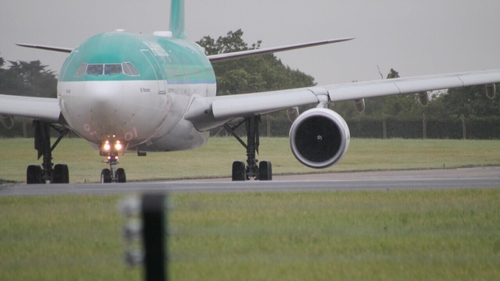
Some Aer Lingus cabin crew to be temporarily laid off
by Ingrid Miley, https://www.facebook.com/rtenews/Aer Lingus has told its Shannon-based cabin crew that they are to be temporarily laid off, while those based in Dublin and Cork are to see rosters and pay reduced from 50% to 30% of normal.
In a video message to staff, Head of Inflight Services Mary Montgomery notes that the airline had already committed to pay and rosters being at 50% of normal salary until 21st June, despite the flight schedule being at just 5% of normal traffic - a situation she describes as unsustainable.
She notes that at the start of the year, Aer Lingus and its owner IAG were in a very strong financial position, but that over recent months, the cash-burn has been "extraordinary" and no revenue has been generated.
Ms Montgomery also refers to the Irish Government's decision to retain the non-essential travel ban and the 14 day self-isolation restriction for anyone arriving into Ireland. She also warns staff that Aer Lingus now needs to match its resources to the current schedule.
"Shannon base has had zero flights for the last two months and this will continue for the next roster period, therefore we have no option but to temporarily lay off crew based in Shannon".
For Dublin and Cork-based crew, rosters and pay will be cut from 50% of normal salary to 30% for July and August.
Read more:
Ryanair's O'Leary says quarantine measures won't work
Dalata boss outlines what post-Covid hotel stay will look like
The airline has also proposed more efficient crewing arrangements for in-flight services.
It will also require cabin crew to engage in "marshalling" of passengers when they land in Dublin, saying this will create efficiencies in ground allocation of work and generate an overall saving.
Ms Montgomery tells staff said that while she worked alongside many of them through 9/11, SARS, Foot and Mouth and the global financial crisis, "...we never envisaged the impact of what we are experiencing now."
She said: "The outlook for the next few months remains bleak. The only certainty we have is recovery will be very slow.
"We know this is a difficult time for all but it is critical that we take actions now to reduce our costs while we restructure for the future".
In a statement to RTÉ, Aer Lingus said that it was communicating with employees on an individual level as it aligned working hours and pay with the amount of work that needs to be done.
The airline noted: "Unfortunately Aer Lingus is currently not operating any flights out of Shannon Airport.
"We have also been engaging with the representative bodies on an ongoing basis regarding the urgent requirement to reduce costs across our business given the decimation in demand for travel in the immediate term and the uncertainty regarding future travel thereafter".
Forsa, which represents a majority of Aer Lingus cabin crew, said the measures announced today involved a "unilateral" decision by the airline, and had not been agreed with the union.
A spokesperson has said that for the moment, they were only aware that these measures applied to cabin crew. He said layoffs would only apply in Shannon, with the 30% reduction in working hours and pay applicable in Dublin and Cork.
In a separate management video briefing, Sean Murphy, Aer Lingus executive director of human resources and Dublin Airport operations, warned that staff will face further hardship until passenger numbers recover.
"We cannot continue to pay people at levels we currently do when there is no work or very little work," he added.
Mr Murphy told staff he never thought Aer Lingus would see its fleet grounded for 10 weeks.
"Of course wage subsidies have helped," he said. "However, they only contribute a fraction of the cash that leaves our business every week. Having a good business model and a valued history does not guarantee survival."
He told staff that when passenger loads start to return, Aer Lingus will rebuild "from the bottom up", gradually increasing hours and pay in line with the recovery, with priority given to people with the willingness to take on new skills.
Mr Murphy warned changes will require staff flexibility and upskilling, involving "new rosters, new ways of work allocation, working in teams or smaller units, and using technology where possible".
He cited cleaner aircraft, improved operational performance, getting aircraft onto stands using guidance systems, as well as offloading and processing bags through the hall.
There will also be changes to check-in and boarding processes, aircraft cleaning, and staff who work on the ramp will be required to do all loading tasks.
"You will be asked to upskill, take on new tasks, multi-task, work differently. Sometimes we might have to have a frank conversation, but for the vast majority that is already a feature of how you work," Mr Murphy told staff.
In a plea to individual employees, Mr Murphy stated: "This is not a time to be distracted by the industrial agenda and a collective mindset. This is a time, as an individual, to make your own decisions and when the time comes and you are called onto the pitch to perform, that you are ready and embrace that challenge."